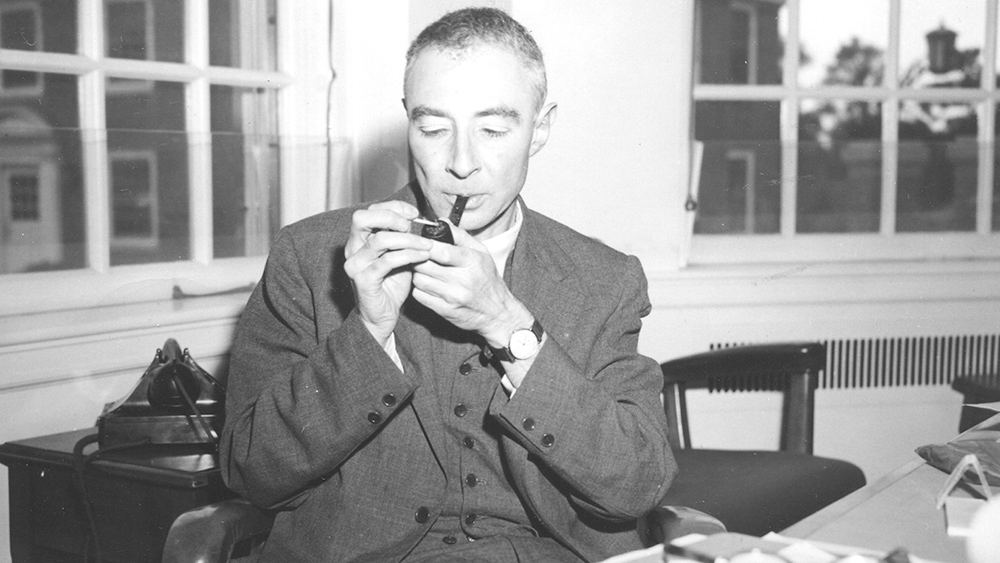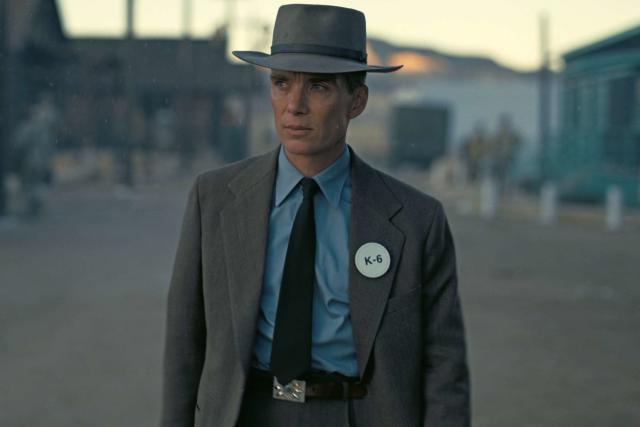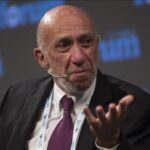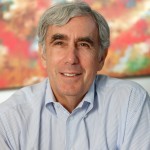The Legacies of David Krieger and Robert Oppenheimer: Iconic Signatures of the Nuclear Age
WEAPONS OF MASS DESTRUCTION, 18 Mar 2024
Richard Falk | Global Justice in the 21st Century – TRANSCEND Media Service
14 Mar 2024 – Today, at the local Music Academy Concert Hall, I gave the ‘keynote address’ in the memorial event honoring the personal and political legacy of David Krieger, the president of the Nuclear Age Peace Foundation here in Santa Barbara, California. In this slightly modified text I stress the comparison between Oppenheimer, the film, and Krieger, the civil society star anti-nuclear activist as well as the personae of these two extraordinary individuals.
Let me begin by adding my greetings to the many members of David’s family that are here among us on this most special occasion– at once solemn in our remembrance of loss and celebratory in our sense of David’s lifetime dedication to what Lincoln called ‘our better angels.’
I feel moved and challenged to be part of this remembrance of David, coming a few days after the question of nuclear weapons was brought before the American people by the many honors heaped on Christopher Nolan’s Oppenheimer at the Academy Awards ceremony. I believe it accurate to suggest that not since the Cuban Missile Crisis of 1961 or perhaps even the atomic attacks on Japanese cities at the end of World War II has there been such public attention given to the dangers of nuclear war by ordinary American citizens. Of course, this flurry of concern was abetted in a variety of ways by the nuclear diplomacy of Vladimir Putin, which can be best understood as both a threat and a warning. It seems to be sending a message to the West that Russia is ready for nuclear war if the US escalates its involvement in the Ukraine War by sending US troops to fight alongside the Ukrainians, a course of action many of us oppose for reasons additional to those associated with Putin.

American theoretical physicist Dr. J. Robert Oppenheimer (1904 – 1967) lights his pipe as he sits behind his desk at Institute for Advanced Study, Princeton, New Jersey, late 1940s.
(Photo by PhotoQuest/Getty Images)
The loss of David in 2023 given these background circumstances reminds us of his lifelong dedication to ridding humanity of the nuclear menace both by educating Americans and others about the apocalyptic dangers of nuclear war and by his sharp criticisms of the distressing embrace of nuclear weaponry by the US Government and its main alliance partners during the Cold War and ever since. This embrace included the bipartisan failure to comply with international law, most explicitly with Article VI of the Nonproliferation Treaty requiring nuclear weapons states to seek in good faith nuclear disarmament. In a more personal sense David left us at a time when I know that he felt that his successor as President of the Nuclear Age Peace Foundation would provide the same commitment, energy, and inspiration in providing the same practical leadership that so vividly defined David’s professional and spiritual identity. I know that I speak for the entire Board and Staff of the NAPF when I say that we all share David’s sense that the Foundation is in the best possible hands under this leadership provided by Ivana [EEVENA] Hughes; we could not be more fortunate having Ivana [EEVENA] as David’s successor, which I am glad to report is a view that David fully shared.
My own special friendship with David stretching over a period of more than four decades combined three dimensions that I have experienced with no other person on this or any other planet—first, an abiding love of poetry as a source of deep knowledge of truth, the good, and beautiful, as stretching our sense of reality beyond what is expressible in ordinary language, and also as poets taking on the most challenging of spiritual practices, secondly, our shared love of tennis as an exalting and satisfying, if at time frustrating blend of sport and fellowship, and thirdly, our shared sense of horror and fear with respect to all that was associated with past, present, and future of nuclear weaponry. This last gave rise in David to a resolve not to be a passive observer in this wrong turn taken by the human species but to embark on a lifelong commitment to do everything within his power to work toward the abolition of this infernal weaponry not primarily to avoid himself experiencing such a culminating human tragedy but more so for the sake of those he loved, of yet unborn future generations, and on behalf a benign destiny for humanity.

Cillian Murphy really learned how to give a physics lecture in Dutch for “Oppenheimer.” Yahoo News Malaysia
We also talked quite often of a fourth shared enthusiasm, which would involve nurturing our fondness for the game of chess. Perhaps, because it might have served as a way of testing our relative abilities we never got around to it, and in this sense it was undoubtedly my good fortune to advert humiliation as we, somewhat suspiciously, never did find an opportunity to match wits in this manner. Another aspect of this special friendship was the closeness of our two families, as more broadly shared with Imaging and Gerry Spence, reinforced by the closeness of my wife, Hilal, with Carolee and Mara, David’s ever so faithful and loving partner and his beloved, amazing daughter.
I know that others more qualified than I have read and will be reading some of David’s poems, but I wanted to frame my remarks by a poem that expresses with devastating conciseness the morbid hypocrisy of those standing guard over our arsenal of nuclear weapons and continuing to this day to do so with a smile of national self-righteousness:
A Short History Lesson: 1945
August 6th
Dropped atomic bomb
On civilians
At Hiroshima.
August 8th:
Agreed to hold War crime trials
For Nazis.
August 9th:
Dropped atomic bomb
On civilians
At Nagasaki.
I have had the odd personal experience of knowing both David as a cherished friend and Robert Oppenheimer as a somewhat irksome acquaintance. I found an unusual mixture of convergence and divergence in my experience of these two extraordinary individuals. Both of their lives were publicly defined by ‘the bomb,’ Oppenheimer by its development, use, and later as a victim of a witch hunting brought to the fore by his morally driven belated opposition to any development of this weaponry beyond its atomic bomb stage. David became what he was by his horrified reaction to the use of the bomb, anti-nuclear activism reflecting his belief that only people could bring the pressures needed to make governments possessing advanced nuclear technology to give it up , and that his form of engaged citizenship in the Nuclear Age was to exercise civil society leadership in advocating abolition.
In contrast, Oppenheimer never wanted to relinquish altogether the fame he acquired by being widely known as ‘the father of the A-Bomb’ or for that matter his access to top-secret classified documents relating to national security. David had no ambivalence about his opposition to the use of atomic bombs against innocent civilian populations at a time in World War II when diplomacy could almost certainly have achieved the national goal of obtaining Japan’s surrender, while Oppenheimer took satisfaction in the success of his mission, including even the use of the weapon, although he later came to fear and oppose further development, specifically with H-Bomb technology that proved to have an explosive force that was 1000 times greater than the bombs used against Japanese cities. It is this posture which got him into unpleasant trouble with the militarist and foreign policy establishment whose eyes were firmly fixed after 1945 on geopolitical supremacy for the country based on military and economic dominance, and not peace and justice for the world. In a sense, Oppenheimer’s life is a metaphor for the red lines that make working within the structures of government for a more peaceful world dangerous and futile, while David’s life enjoyed the benefits of moral purity but was tormented in anguishing ways by the frustrations of mere citizenship in a country that would not act in accord with its proclaimed values, including respect for international law and the United Nations. Both lives will be forever intimately connected with the realities of ‘the nuclear age’—by their shared opposition to the persistence of nuclearism and by their divergent paths of rejection from within and frustrations from without the established political order. I am sure Ivana will find creative ways of keeping alive this dual pedagogical legacy of both David and Oppenheimer as continuing exemplary figures in this ongoing struggle to avoid a future war fought with nuclear weapons.
Again to speak personally, it was my privilege to have learned from these two iconic figures, although far closer in mind, heart, and soul to one than the other. Let me end with a poem written by David in 2020. I have selected it because it so gracefully expressive of David’s rare comprehension among we Westerners of right living, right feeling, and right knowing:
Wisdom Is…
available to all, but rare
distilled from experience
advanced by dialogue
listening carefully
thinking deeply
doing what is right
selecting good over evil
speaking truth
acting with integrity
living simply
being kind and compassionate
demonstrating courage
learning from nature
Questioning
following the Way (Tao)
helping others
striving for peace with justice
being humble
choosing hope
persevering.
__________________________________________
 Prof. Richard Falk is a member of the TRANSCEND Network, Albert G. Milbank Professor Emeritus of International Law at Princeton University, Chair of Global Law, Faculty of Law, at Queen Mary University London, Research Associate the Orfalea Center of Global Studies at the University of California, Santa Barbara, and Fellow of the Tellus Institute. He directed the project on Global Climate Change, Human Security, and Democracy at UCSB and formerly served as director the North American group in the World Order Models Project. Between 2008 and 2014, Falk served as UN Special Rapporteur on Human Rights in Occupied Palestine. His book, (Re)Imagining Humane Global Governance (2014), proposes a value-oriented assessment of world order and future trends. His most recent books are Power Shift (2016); Revisiting the Vietnam War (2017); On Nuclear Weapons: Denuclearization, Demilitarization and Disarmament (2019); and On Public Imagination: A Political & Ethical Imperative, ed. with Victor Faessel & Michael Curtin (2019). He is the author or coauthor of other books, including Religion and Humane Global Governance (2001), Explorations at the Edge of Time (1993), Revolutionaries and Functionaries (1988), The Promise of World Order (1988), Indefensible Weapons (with Robert Jay Lifton, 1983), A Study of Future Worlds (1975), and This Endangered Planet (1972). His memoir, Public Intellectual: The Life of a Citizen Pilgrim was published in March 2021 and received an award from Global Policy Institute at Loyala Marymount University as ‘the best book of 2021.’ He has been nominated frequently for the Nobel Peace Prize since 2009.
Prof. Richard Falk is a member of the TRANSCEND Network, Albert G. Milbank Professor Emeritus of International Law at Princeton University, Chair of Global Law, Faculty of Law, at Queen Mary University London, Research Associate the Orfalea Center of Global Studies at the University of California, Santa Barbara, and Fellow of the Tellus Institute. He directed the project on Global Climate Change, Human Security, and Democracy at UCSB and formerly served as director the North American group in the World Order Models Project. Between 2008 and 2014, Falk served as UN Special Rapporteur on Human Rights in Occupied Palestine. His book, (Re)Imagining Humane Global Governance (2014), proposes a value-oriented assessment of world order and future trends. His most recent books are Power Shift (2016); Revisiting the Vietnam War (2017); On Nuclear Weapons: Denuclearization, Demilitarization and Disarmament (2019); and On Public Imagination: A Political & Ethical Imperative, ed. with Victor Faessel & Michael Curtin (2019). He is the author or coauthor of other books, including Religion and Humane Global Governance (2001), Explorations at the Edge of Time (1993), Revolutionaries and Functionaries (1988), The Promise of World Order (1988), Indefensible Weapons (with Robert Jay Lifton, 1983), A Study of Future Worlds (1975), and This Endangered Planet (1972). His memoir, Public Intellectual: The Life of a Citizen Pilgrim was published in March 2021 and received an award from Global Policy Institute at Loyala Marymount University as ‘the best book of 2021.’ He has been nominated frequently for the Nobel Peace Prize since 2009.
 David Krieger, Ph.D. was Founder and President Emeritus of the Nuclear Age Peace Foundation, and a member of the TRANSCEND Network for Peace Development Environment. Amongst several of his wide-spanning leadership endeavors in global peacebuilding, he was a founder and a member of the Global Council of Abolition 2000, councilor on the World Future Council, and the chair of the Executive Committee of the International Network of Engineers and Scientists for Global Responsibility. He had a BA in Psychology and an MA and Ph.D. degrees in Political Science from the University of Hawaii as well as a J.D. from the Santa Barbara College of Law; he served for 20 years as a judge pro tem for the Santa Barbara Municipal and Superior Courts. Dr. Krieger was the author of many books and studies of peace in the Nuclear Age. He has written or edited more than 20 books and hundreds of articles and book chapters. He was a recipient of several awards and honors, including the OMNI Center for Peace, Justice and Ecology Peace Writing Award for Poetry (2010). For more visit the Nuclear Age Peace Foundation website: www.wagingpeace.org.
David Krieger, Ph.D. was Founder and President Emeritus of the Nuclear Age Peace Foundation, and a member of the TRANSCEND Network for Peace Development Environment. Amongst several of his wide-spanning leadership endeavors in global peacebuilding, he was a founder and a member of the Global Council of Abolition 2000, councilor on the World Future Council, and the chair of the Executive Committee of the International Network of Engineers and Scientists for Global Responsibility. He had a BA in Psychology and an MA and Ph.D. degrees in Political Science from the University of Hawaii as well as a J.D. from the Santa Barbara College of Law; he served for 20 years as a judge pro tem for the Santa Barbara Municipal and Superior Courts. Dr. Krieger was the author of many books and studies of peace in the Nuclear Age. He has written or edited more than 20 books and hundreds of articles and book chapters. He was a recipient of several awards and honors, including the OMNI Center for Peace, Justice and Ecology Peace Writing Award for Poetry (2010). For more visit the Nuclear Age Peace Foundation website: www.wagingpeace.org.
Go to Original – richardfalk.org
Tags: Activism, David Krieger, J Robert Oppenheimer, Nuclear Abolition, Nuclear Weapons, Richard Falk
DISCLAIMER: The statements, views and opinions expressed in pieces republished here are solely those of the authors and do not necessarily represent those of TMS. In accordance with title 17 U.S.C. section 107, this material is distributed without profit to those who have expressed a prior interest in receiving the included information for research and educational purposes. TMS has no affiliation whatsoever with the originator of this article nor is TMS endorsed or sponsored by the originator. “GO TO ORIGINAL” links are provided as a convenience to our readers and allow for verification of authenticity. However, as originating pages are often updated by their originating host sites, the versions posted may not match the versions our readers view when clicking the “GO TO ORIGINAL” links. This site contains copyrighted material the use of which has not always been specifically authorized by the copyright owner. We are making such material available in our efforts to advance understanding of environmental, political, human rights, economic, democracy, scientific, and social justice issues, etc. We believe this constitutes a ‘fair use’ of any such copyrighted material as provided for in section 107 of the US Copyright Law. In accordance with Title 17 U.S.C. Section 107, the material on this site is distributed without profit to those who have expressed a prior interest in receiving the included information for research and educational purposes. For more information go to: http://www.law.cornell.edu/uscode/17/107.shtml. If you wish to use copyrighted material from this site for purposes of your own that go beyond ‘fair use’, you must obtain permission from the copyright owner.
Read more
Click here to go to the current weekly digest or pick another article:
WEAPONS OF MASS DESTRUCTION:
